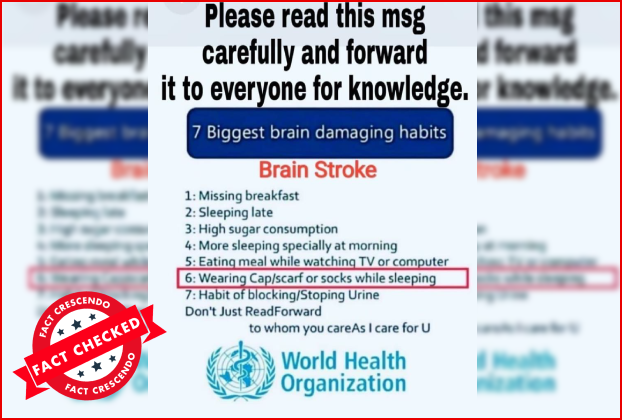
Human brain is arguably the most complex organ in the human body and recognized as the body’s command center, influencing every aspect of life. There are thousands of social media posts related to the human brain, its structure, and functional details.
This is our investigation related to a viral social media post attributing to WHO and claiming to be seven biggest brain damaging habits.
Social Media Posts
Poster viral among Sri Lankan WhatsApp users indicated that World Health Organization (WHO) had declared seven habits as the biggest causes for brain damage leading to stroke.
The habits listed as brain damaging habits are as follows.
1: Missing breakfast
2: Sleeping late
3: High sugar consumption
4: More sleeping especially in the morning
5: Eating meal while watching TV or computer
6: Wearing Cap/scarf or socks while sleeping
7: Habit of blocking/Stopping Urine

These posts were viral among Facebook users not only in Sri Lanka but around the world.

Some very recent posts can be found from here and here. Archived & Archived
Fact Check
First, we checked whether WHO had officially published the above graphic or any of its content as the biggest causes for brain damage. While WHO along with other health authorities had advised on negative impacts of some of the listed activities we didn’t not find any specific reference to such a list or graphic attributed to WHO.
And we detected in an AFP Philippine’s report in which local WHO officers had denied these social media posts stating that WHO had not declared such a list of brain damaging habits Archived.
We also noticed that these viral messages had been shared in Nigeria a few years ago and WHO Nigeria had also denied the claim as reported by this ICIR report. They also had noticed that similar messages had circulated in Nigeria since 2017.
So, it`s clear that WHO did not declare such a list of 7 brain damaging habits.
However, many experts believe sleep deprivation is one of the key aspects which has a negative impact on brain cells and The Harvard Medical School has mentioned a few other factors such as lack of socializing, too much sitting and chronic stress to be brain damaging habits as seen here. Archived
In addition, others have also listed working even when you are sick, lack of brain stimulation, along with skipping breakfast and daily intake of water, also , as some of the habits that could have a negative impact on brain activity as seen in this video
Next, we thought of looking at each of the points listed in the viral poster and available research and expert views on these topics towards brain activity and brain damage
1) Missing Breakfast:
While there is limited research on brain activity and skipping breakfast, experts do not encourage skipping breakfast, the most important meal of the day.
A research done in China, suggest that skipping breakfast or eating a low-quality breakfast have a negative effect on cognitive function as seen here | Archived. Another study showed higher activity along the internal surface of the prefrontal cortex when the nutritionally balanced liquid food had been consumed for breakfast as compared to when a sugar solution or water was consumed.
Dr. Sushma Sharma, Senior Consultant and HOD, Neurology at Metro Hospital, Faridabad also agrees that missing breakfast could have a bad impact on brain activity, but brain damage is a very strong word and there isn’t enough evidence to suggest it causes significant neurological problems. Full report can be read from here. Archived.
2) Sleeping Late:
More than sleeping late, inadequate hours of sleeping can cause brain damage, and this is a point agreed upon by many experts as seen above. Usually 7-9 hours of sleep is advised for an adult human for proper cognitive functions and not only too little sleep, but too much of it also could affect memory as pointed out in this Harvard health blog.
3)High Sugar Consumption:
According to Harvard Medical School, the high glucose level of the blood can cause cognitive difficulties, as well as brain damages. They describe it as below.
“High blood glucose levels can affect the brain’s functional connectivity, which links brain regions that share functional properties, and brain matter. It can cause the brain to atrophy or shrink. And it can lead to small-vessel disease, which restricts blood flow in the brain, causing cognitive difficulties and, if severe enough, spurring the development of vascular dementia.” The article can be read here | Archived.
WHO also state that in both adults and children, the intake of free sugars should be reduced to less than 10% of total energy intake and further reduction to less than 5% of total energy intake would provide additional health benefits.
4) More sleeping specially at morning:
There is no evidence of direct relationship with more sleep during mornings to brain damage. However, if you sleep more during morning time the biological rhythm can be changed and it can cause some harm to the people. More on this here . Archived.
5)Eating Meal while watching TV or computer.
This again does not directly have an impact on damage to the brain. However, one could lose awareness and eat excessively when they eat while watching the television. Doing so can lead to overeating. A study about this can be read from here. Archived. The American Journal of Clinical Nutrition noted that watching TV as you eat can lead you not to pay attention to fullness cues.
6)Wearing a cap or socks while sleeping
According to medical experts, wearing caps/socks do not have any special harmful impacts towards the brain as well as to the overall health. In fact, in colder climates, this helps for a comfortable sleep, and it can be considered as a good factor for brain function. A medical fact check about this can be read from here. Archived.
7) Habit of blocking Urine:
While there is no evidence of direct brain damage, holding urine is not an advisable habit and could lead to weakening of the bladder muscles. It can also interfere with kidney functionality and an article about this can be read from here. Archived.
Here is an article published by WHO on World Stroke Day in 2021, on lifestyle risk factors for stroke include being overweight or obese, physical inactivity, tobacco use and alcohol abuse. Medical risk factors include high blood pressure, high cholesterol, diabetes and a personal or family history of stroke or heart attack.
Follow us and stay up to date with our latest fact checks.
Facebook | Twitter |Instagram | Google News |TikTok
Conclusion
According to our investigation, it`s clear that WHO has not released a list claiming to be seven brain damaging habits. However, some of the habits listed in the poster, especially when carried out on a routine basis, could lead to serious negative impacts on the human body and as well as brain activity.

Title:While some of these habits can impact brain activity; this is NOT a list attributed to WHO
Fact Check By: Kalana KrishanthaResult: Misleading





